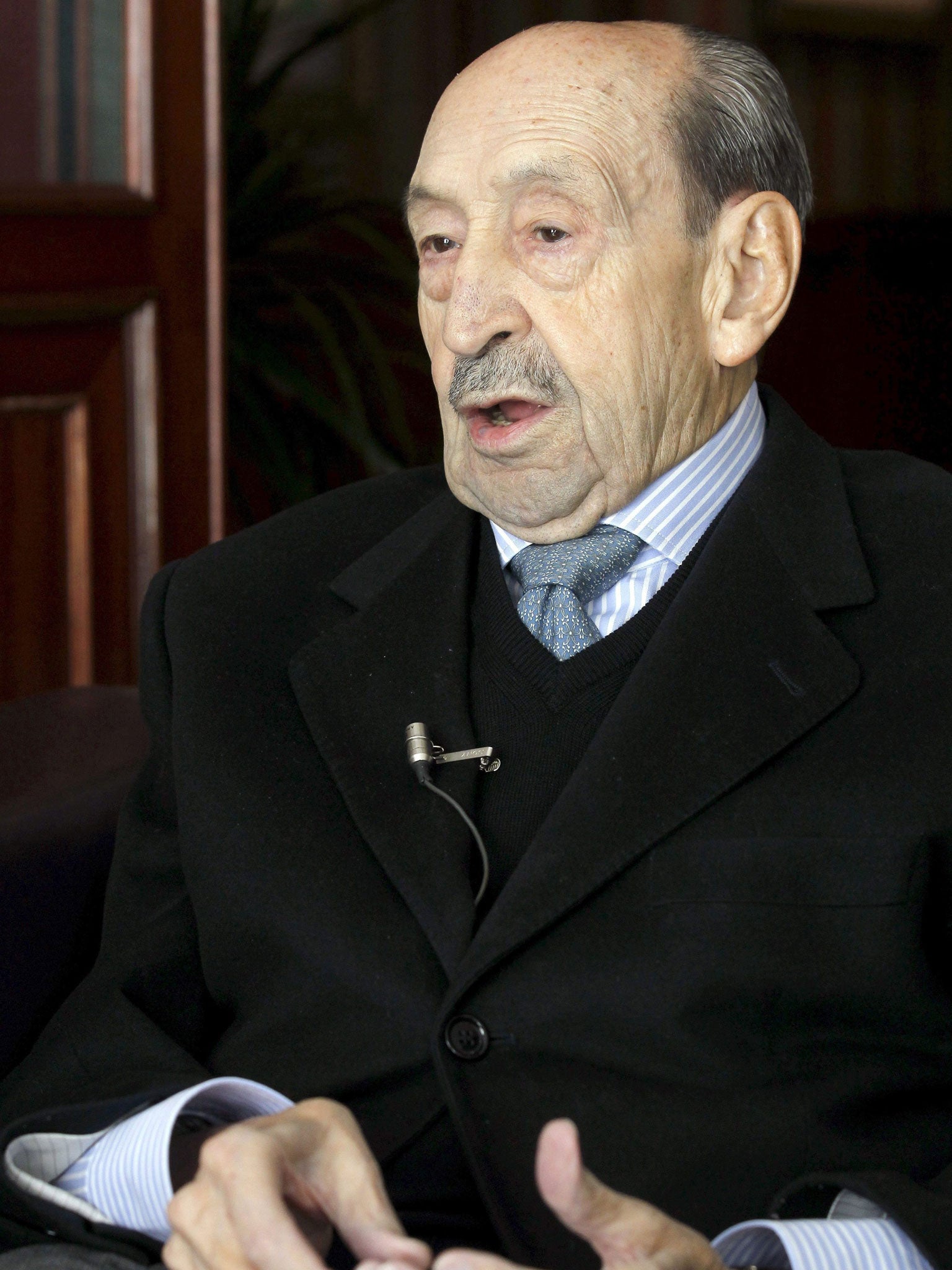General Alfonso Armada: Soldier whose death means that the mysteries surrounding the 1981 attempted coup in Spain may never be solved

One of the biggest questions about Alfonso Armada is what he really knew about the attempted coup d'etat that took place in Madrid on 23 February 1981, and which he refused to reveal. His silence did not save him from a 30-year prison sentence as one of the three top names in the coup, known in Spain as the 23-F, together with Colonel Tejero, whose civil guards held the government hostage in parliament for the best part of a night and a day, and Lieutenant General Jaime Milans del Bosch.
Considered to be the brains behind the coup, Armada consistently claimed that his only involvement was to negotiate Tejero's surrender, signed on the bonnet of a Land Rover outside the parliament on 24 February. But his imprisoned fellow conspirators – who would burst into a chorus of the Spanish children's song "Now we're going to tell lies" every time they saw Armada enter the visitors' room in their prison – clearly thought otherwise, and so do many political observers in Spain.
He was born in 1920 into a military family and early in the civil war he joined General Franco's Nationalist forces. By the end of the three-year conflict he had risen to acting captain. He fought in Spain's "blue division" of volunteers who supported the Axis, spending 18 months on or near the frontline in Leningrad before returning to Spain in 1943. (It was in Russia that he first met Milans del Bosch.)
After the war, he moved from one desk job to another, and from 1955, while gaining promotion after promotion, he formed part of the group of military instructors who educated Spain's future king, Juan Carlos. He was a colonel by 1970, his ambition and power evident from the number of positions he held simultaneously: military secretary to the prince's household; director of information-gathering operations for Spain's nuclear-energy security council; co-editor of the ominously entitled Reconquista (The Re-conquest) inhouse military magazine; and director of an artillery academy. Following Franco's death and Juan Carlos's coronation in November 1975 Armada remained one of the king's closest advisers and was promoted to brigadier-general.
However, Spain's then president Adolfo Suarez, aware that Armada was a powerful conservative, ensured that he was removed from his influential position as military secretary for the royal household in October 1977. But after he was given a posting far from the political infighting in Madrid as governor of Lerida in 1980, Armada's luck turned again when his enemy Suarez resigned in January 1981.
He returned to Madrid after taking the post of deputy-in-command of Spain's army. He was now ideally placed to wield immense influence. And as Spain's fledgling democracy struggled to cope with spates of political violence and the limited co-operation of the armed forces, parts of which were keen for a return to the days when the military ran the country, it seemed only a matter of time before one of those conspiracies developed into more than barrack-room talk.
Aware of Tejero and Milans del Bosch's plans to establish a military junta, Armada is believed to have favoured a less hardline approach, proposing a combined cross-party and military "government of national salvation" with himself as president. He had apparently been sounding out top opposition politicians even while isolated in Lerida, and he obtained a degree of backing for his plan that remains unclear to the present day.
However, Tejero upstaged Armada by bursting into the Spanish parliament at the head of 200 civil guards on the evening of 23 February 1981 and taking almost all the deputies hostage. Met by Armada at the parliament building, Tejero then apparently refused point-blank to consider his offer of a combined military and civilian government and a flight out of Spain.
Tejero's refusal combined with other events to doom the coup, most notably when the king made a speech on TV in military uniform which definitively established he did not support it, as the conspirators had claimed. General Milans del Bosch ordered his division's tanks out on the streets of Valencia, but while it later became clear that much of Spain's political and military establishment had been waiting to see what happened, no other general followed.
Armada attempted to rebrand himself as the saviour of democratic Spain by ensuring he negotiated Tejero's surrender, but the military courts were having none of it, and he was declared guilty with 21 others of conspiracy.
His six-year sentence was extended to 30 at the government's insistence, but Armada was freed, allegedly for health reasons although he enjoyed a robust old age, at the end of 1988. He withdrew to his second home in Galicia, where he became a gardening expert specialising in camellias, and still swearing in interviews as recent as two years ago, that he had never conspired to overthrow Spanish democracy.
With his death one of the best chances of ascertaining who was due to rule Spain had the coup succeeded, a never-identified figure nicknamed "White Elephant", has disappeared. The names of other conspirators never brought to trial are even less likely to emerge. Armada's death all but ensures that key elements of one of Spain's biggest political mysteries will remain unsolved.
ALASDAIR FOTHERINGHAM
Alfonso Armada, soldier: born Madrid 12 February 1920; married 1944 Maria Francisca Diaz de Rivera (10 children); died Madrid 1 December 2013.
Subscribe to Independent Premium to bookmark this article
Want to bookmark your favourite articles and stories to read or reference later? Start your Independent Premium subscription today.

Join our commenting forum
Join thought-provoking conversations, follow other Independent readers and see their replies